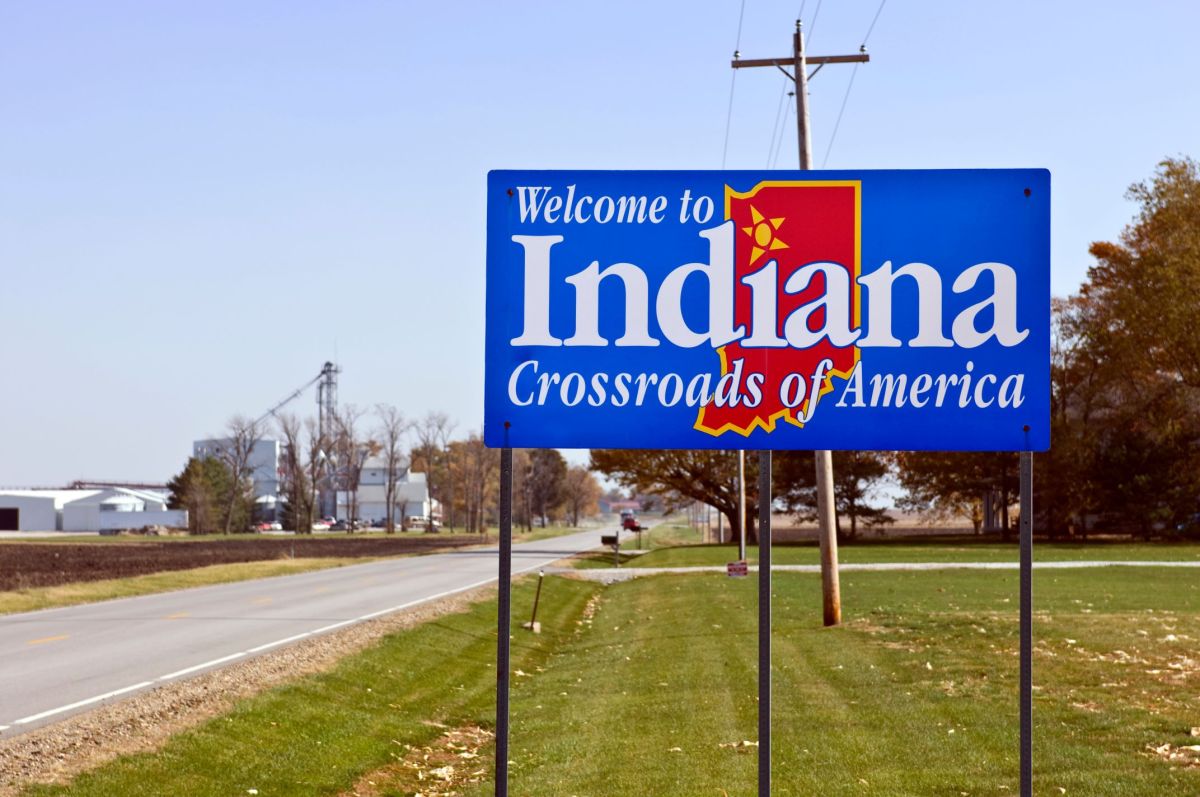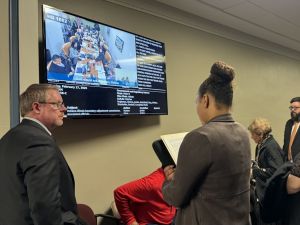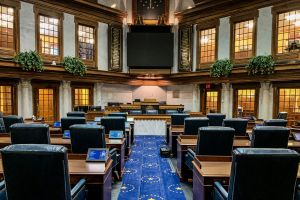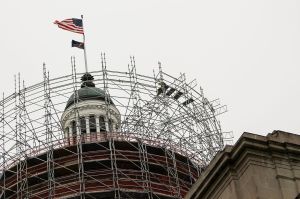
A bill that could prompt multiple counties to leave Illinois and join Indiana advanced to the House chamber on Monday, Feb. 17, 2025. (Katherine Welles/Adobe Stock)
A bill that could help Indiana absorb nearly three-dozen Illinois counties breezed through committee Monday — although a border shakeup appears unlikely.
Republican House Speaker Todd Huston’s proposal would create an Indiana-Illinois Boundary Adjustment Commission tasked with exploring the secession and transfer of counties that have already voted to leave the state of Illinois.
Huston said House Bill 1008, part of the majority caucus’ priority agenda, seeks to show disgruntled Illinois residents that Indiana “welcomes” those counties “to consider joining our state.”

“We don’t want to see our neighbors to the west languish. Ultimately, their success or failure affects our own success or failure. But it’s up to them to change their course,” Huston said before the House government committee on Monday. “In the meantime, to Illinois counties and residents feeling unheard and underrepresented, we hear you. We’d like to invite you to come back home again to Indiana.”
A push for Illinois counties to separate has been ongoing for at least a decade but is gaining traction. Since 2020, 33 Illinois counties have passed “advisory referenda” to secede from the Prairie State — with seven of those votes occurring in the November general election.
Local officials — many from rural counties in southern and central parts of Illinois — cited frustrations over high taxes, as well as the wide cultural divide between rural Illinois and urban Chicago.
The referenda language involved the counties splitting off to create a new, 51st state — not joining Indiana. Some who testified at Indiana’s Statehouse still preferred a new state, but several were open to Huston’s idea.
“Our biggest grievance is that we are not represented,” said Gina Merritt, chair of the nonprofit New Illinois, a group that aims to form an entirely new state. “We don’t have government of the people, by the people, and for the people. Our governor accuses us of wanting to kick Chicago out of Illinois. Not so. We want to kick ourselves out of Illinois.”
Huston offering a bill is novel because the House Speaker usually doesn’t author legislation.
‘More in common with Indiana’
The proposed commission would have five appointed Hoosier lawmakers and five appointees from Illinois.
After naming Indiana’s members, Gov. Mike Braun would have to notify Illinois Gov. J.B. Pritzker that he’s appointed members. The group would hold its first meeting within two months of Prtizker picking members to represent Illinois.
Swapping states isn’t guaranteed — or likely, however.
Illinois would lose federal funding and Republicans would see their bicameral superminorities further shrink, among other potential Prairie State quibbles. But Illinois would need to approve the move, alongside Indiana. Then, it’d head to the U.S. Congress for approval.
Story continues below.

(Photo courtesy Red State Secession)
Pritzker, a Democrat, is not on board. Last month, he called the Indiana bill “a stunt” that is “not going to happen.”
“I’ll just say Indiana is a low-wage state that doesn’t protect workers, a state that does not provide health care for people when they’re in need, and so I don’t think it’s attractive for anybody in Illinois where wages are higher where the standard of living is higher, and we do provide health care for people in need,” Pritzker said when asked about the bill.
The Illinois Attorney General additionally issued an opinion that counties can’t leave the state on their own. It’s the same conclusion reached by the United States Supreme Court in 1907, in Hunter v. Pittsburgh, when justices ruled that counties “are political subdivisions of the state, created by it and at all times wholly under its legislative control.”
Illinois has a population of almost 13 million, with roughly half residing in the greater Chicago area.
Those who testified on Monday said that gives Chicago a dominant position in Illinois state government and “ensures” the state’s strong Democratic control. But while most Illinoisans live in Democratic districts, the majority of the state’s land is in rural communities dominated by Republican politicians.
Merritt, with New Illinois, said Illinois communities outside of Cook County have “much more in common with Indiana,” like fiscal discipline and lower taxes.
“We very much appreciate that you see us, that you hear us, that you empathize with our experience. We wish our own state government would do the same,” Merritt said. “We thank the leadership of Indiana for recognizing our pain.”
Mike Speedy, Indiana’s new secretary of business affairs, maintained Monday that Illinoisans “have noticed the stark contrast between the low tax and spend of our state, and that of their own voted state government.”
“Indiana is a great place to start and raise a family, where public safety is paramount, family values flourish, and where economic growth is the standard, not the exception. Our neighbor to the west has one of the most dangerous cities in the country, making it easy for illegal immigrants to remain in the United States and continue to increase our taxes,” said Speedy, a former state representative. “Illinoisans have noticed a stark contrast. And they want freedom. They want a pro-opportunity, pro-business state.”
Could Indiana counties secede?
The bill advanced 11-1 from the House committee with bipartisan support.
Rep. Chris Campbell, D-West Lafayette, was the only committee member to vote against the bill.
“The grass is not always greener,” Campbell said. “I’m not ready to disrupt the constitutions that we have created in our states and in our country. I think that this creates the great divide of the red and blue states. I don’t like the message that it sends.”
During the meeting, Campbell asked about the fiscal impact to Indiana if the state absorbed the proposed rural areas of Illinois.
Huston said that’s something the commission would review.
“This is just raising our hand to a group of people that feel disenfranchised, who feel like their voice hasn’t been heard. They’re not being represented,” Huston said. “Some of them are going to talk about succeeding. That’s certainly one path to go. We’re just raising our hands to say, ‘look this is a great opportunity to have a discussion.’”
Rep. Ragen Hatcher, D-Gary, said the majority of Lake County residents feel a similar lack of government representation as those in downstate Illinois.
She asked the house speaker if the commission would look at ways for counties like hers “to move over to Illinois” because Chicago, for example, “is more aligned with the views and the issues and the problems that we face.”
“Is this a two-way street or is it a one-way street?” Hatcher asked.
Huston said “anything could be considered,” but he cautioned against the idea.
“I’d think you’d want to take a good, hard, long look before you consider heading west what the consequences and the challenges that you might face,” he added.
Hatcher further asked if the bill was proposed based on the fiscal benefits for Illinois residents who would become part of Indiana, or “about the political leaning of this area … and how they are outweighed in their own state.”
Huston said the bill wasn’t proposed based on a political advantage for Indiana, noting that the political landscape could shift “50 to 100 years from now.”
He maintained the bill was filed primarily “because people are seeing the benefits of moving to Indiana.”
Hatcher ultimately voted in favor of the bill hoping that “possibly, this is a two-way street.”
“It’s a bill that shows that we care about how other people perceive the type of government that they live within, and I think that’s important,” Hatcher said. “I think that when we’re talking about things that are happening in north Lake County, and we say, ‘Hey, we don’t feel heard. Hey, we feel like this bill that you all are passing may be good for rural Indiana, but isn’t good for urban Indiana.’ We want to be heard as well.”
Indiana Capital Chronicle is part of States Newsroom, a nonprofit news network supported by grants and a coalition of donors as a 501c(3) public charity. Indiana Capital Chronicle maintains editorial independence. Contact Editor Niki Kelly for questions: info@indianacapitalchronicle.com.











